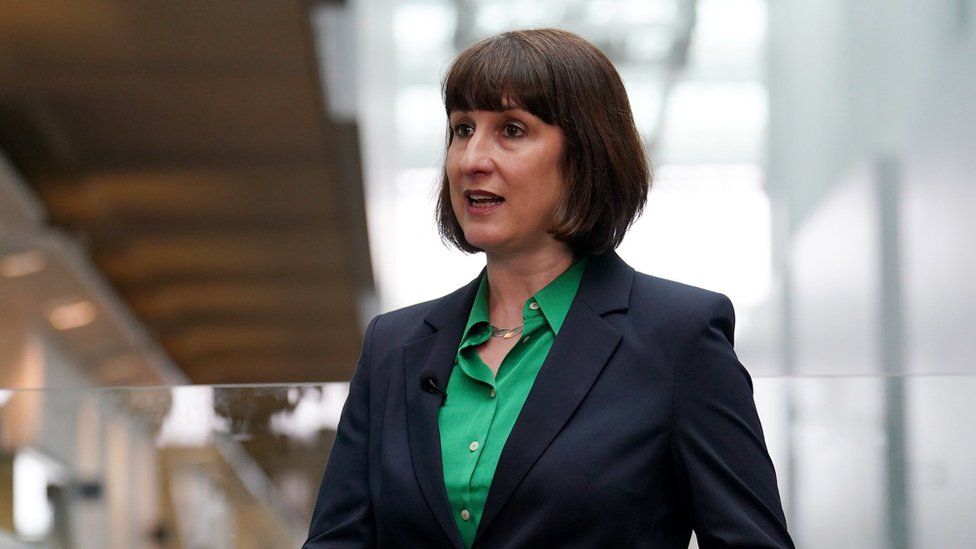
Labour is pledging to fund policies on the NHS and school breakfast clubs by boosting efforts to tackle tax dodgers.
Shadow chancellor Rachel Reeves says her plans to give officials up to £555m to improve tax collection would help raise £5.1bn a year.
Speaking at a hospital in Manchester, she will accuse the Conservatives of having “failed to tackle the issue”.
Treasury Minister Laura Trott said the Tories had introduced 200 measures to clamp down on tax non-compliance.
“After a month of searching for a plan to pay for Labour’s unfunded spending, the shadow chancellor still cannot say how she will fill the enormous black hole in their promises. And that means one thing – more taxes,” she said.
Labour had been planning to pay for flagship pledges – including £365m for free school breakfast clubs and £1.6bn for more hospital and dentists appointments – by replacing the UK’s current non-dom tax regime.
Under the arrangement, non-domiciled people live in the UK but have their home overseas for tax purposes and do not pay UK tax on money they make elsewhere.
However at his spring Budget, Chancellor Jeremy Hunt said he would change the non-dom tax rules to pay for a cut to National Insurance.
Labour has a self-imposed rule that, if elected, it will not borrow to fund day-to-day spending and following Mr Hunt’s non-doms announcement the party faced questions as to how it would fund its existing promises.
Last month, Ms Reeves told the BBC she would “go through every pound” in the government’s spending plans to find money for the policies.
Now, she has set out her alternative plan, which involves an effort to bolster the amount the HM Revenues and Customs (HMRC) collects in tax.
Citing HMRC figures, Labour said the gap between the amount of tax owed and what the government actually collects stood at £36bn in 2021/22.
The party also points to a recent Financial Times interview in which the head of the spending watchdog the National Audit Office said the government could save £6bn a year by tackling tax evasion and avoidance.
Labour says it would spend £555m on increasing the number of tax officers to work on investigations and tackle fraud.
It also wants to invest in digitising the tax office to improve customer services and “free up resources to focus on more complex cases”.
This, the party estimates, would raise £0.7bn in 2025/26 growing to £5.1bn a year by the end of the Parliament.
Ms Reeves said her approach would “give HMRC the resource it needs to go after those who are avoiding or evading tax, and to modernise the tax office so we have a system that is fit for purpose”.
HMRC has been calculating the tax gap – the difference between how much money is raised in taxes and a theoretical calculation of how much could be raised – since 2005.
It says there has been a “long-term reduction” with the gap falling from 7.5% in 2005 – when Labour was in power – to 4.8% in 2021/22.
While Labour backs Mr Hunt’s proposed replacement of non-dom rules it says there are parts that could be strengthened, such as including foreign assets held in a trust within UK inheritance tax and removing a 50% discount in the first year of the new rules.
In total Labour says these changes could bring in £1bn in one year, rising to £2.6bn over the course of the next Parliament.
Liberal Democrat Treasury spokeswoman Sarah Olney MP said: “Tinkering around the edges won’t be nearly enough.”
She added: “The Liberal Democrats have set out fully-costed plans to make sure everyone can get the care they need.”
Helen Miller, deputy director of the Institute of Fiscal Studies think tank, said it was “common for governments to announce plans to try to raise revenue by reducing avoidance or evasion”.
However, she added that an evaluation by the Office for Budget Responsibility, which monitors the government’s spending plans, “emphasised the uncertainty around both how much revenue such measures raise and how quickly revenue can be brought in”.
